八年级英语下册第一单元课件
合集下载
人教版八年级英语下册教学PPT课件Unit1第一课时(Section A 1a-2d)
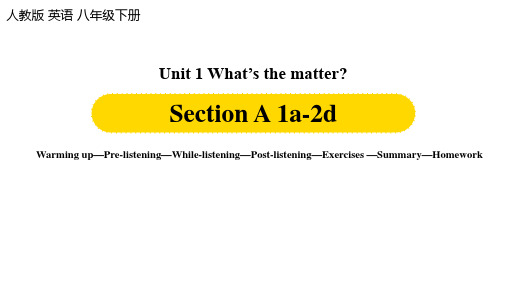
Nancy: has a toothache
Sarah: has a cold
Ben: has a sore back
David: got a stomachache last night
Judy: has a very sore throat
While-listening
Listen again and fill in the blanks.
Nancy____ Sarah ____ David ____ Ben ____ Judy ____
While-listening
1b Listen and look at the picture. Then number the names[1-5].
Nancy___3__ Ben ___5__
This is my... These are my...
Pre-listening
1a Look at the picture. Write the correct letter[a-m] for each part of the body.
__h___ arm __e___ back __g___ ear __i___ eye __b___ foot ___a__ hand __j___ head __l___ leg __c___ mouth ___d__ neck __m___ nose ___k__ stomach __f___ tooth
last night
birthday party.
has a sore back __h_u_r_t __ _h_im__s_el_f_when playing soccer.
Nancy has a toothache
Sarah: has a cold
Ben: has a sore back
David: got a stomachache last night
Judy: has a very sore throat
While-listening
Listen again and fill in the blanks.
Nancy____ Sarah ____ David ____ Ben ____ Judy ____
While-listening
1b Listen and look at the picture. Then number the names[1-5].
Nancy___3__ Ben ___5__
This is my... These are my...
Pre-listening
1a Look at the picture. Write the correct letter[a-m] for each part of the body.
__h___ arm __e___ back __g___ ear __i___ eye __b___ foot ___a__ hand __j___ head __l___ leg __c___ mouth ___d__ neck __m___ nose ___k__ stomach __f___ tooth
last night
birthday party.
has a sore back __h_u_r_t __ _h_im__s_el_f_when playing soccer.
Nancy has a toothache
人教版英语八年级下册《Unit 1 Section B 1a-1d》教学课件
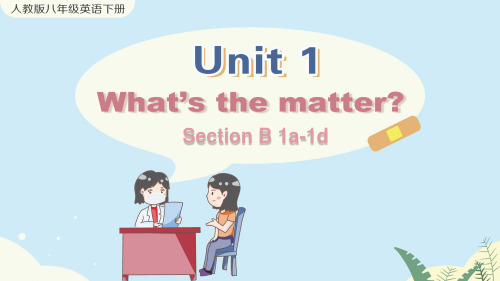
Give advice take some medicine sleep have a good rest see a dentist drink hot water see a doctor
1a
When these accidents happen, what should you do? Put the actions in order.
Section B 1a-1d
➢ Objectives
To learn different treatments when accidents happen.
To learn new words: sick, knee…
Words and expressions
bandage sick knee nosebleed hit
n. 绷带v. 用绷带包扎 adj. 生病的;有病的 n. 膝;膝盖 n. 鼻出血 v. (用手或器皿)击;打
Follow me:
Everybody moves your body Nod your head and touch your face Touch your nose and close your eyes Touch your ears and clap your hands Raise your arms and look at your back Touch your stomach and tap your foot Sit down and move your legs
He should see a doctor.
➢ Pair work: ld get tired be stressed out have a toothache have a sore throat have a headache
人教版八年级下册英语《Unit1单元》ppt

The shadow moves with the sun.影子随着太阳而动。
4.表本身拥有
The girl with two big eyes is my sister.
那个大眼睛的女孩是我的妹妹。
第二十五页,共七十七页。
lie down 躺 下 (Tang)
rest/have a rest 休息
lie down and rest
A:What’s the matter? B: I have a stomachache. A: That’s too bad.You should lie down
and rest.And don’t eat anything for two hours.
B:I guess I should.
see a dentist
A:What’s the matter? B: Oh,I have a toothache. A: You should see a dentist. B:I guess I should.
第二十八页,共七十七页。
problem
question
n. 问题,难题,习题(有待解(Jie)决) n. 问题(有待回答)
第十九页,共七十七页。
Look and match
1. have a cold 2. have a fever 3. have a headache
4. have a stomachache
5. have a toothache
6. have a sore throat
7. have a sore back
4. toothache
5. cut myself
a. lie down and rest
4.表本身拥有
The girl with two big eyes is my sister.
那个大眼睛的女孩是我的妹妹。
第二十五页,共七十七页。
lie down 躺 下 (Tang)
rest/have a rest 休息
lie down and rest
A:What’s the matter? B: I have a stomachache. A: That’s too bad.You should lie down
and rest.And don’t eat anything for two hours.
B:I guess I should.
see a dentist
A:What’s the matter? B: Oh,I have a toothache. A: You should see a dentist. B:I guess I should.
第二十八页,共七十七页。
problem
question
n. 问题,难题,习题(有待解(Jie)决) n. 问题(有待回答)
第十九页,共七十七页。
Look and match
1. have a cold 2. have a fever 3. have a headache
4. have a stomachache
5. have a toothache
6. have a sore throat
7. have a sore back
4. toothache
5. cut myself
a. lie down and rest
人教版八年级英语下册第一单元第一课时PPT课件
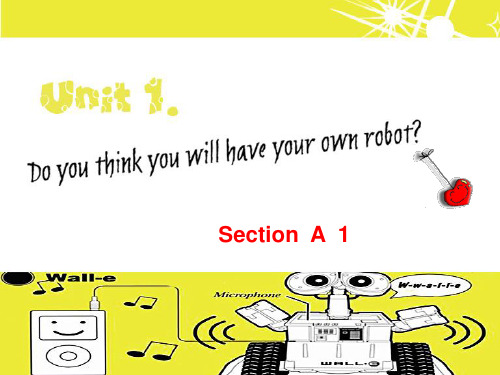
will be _m_o_r_e people. 4. There will bem__or_e_ robots everywhere, and
humans will have _le_s_s__ work to do. 5. There will be _m_o_r_e_ free time when people
当after后接某一时间点时,仍可用于将来时.
.
-----How soon will she come back? ------In a week.她多久后回来? 一周后. He came back to school after two weeks. I think they’ll arrive there after five o’clock. 拓展:later 前加时间段,表示若干时间之后, 常用于过去时(=after后加时间段) He went back to this city eight years later. = He went back to this city after eight years.
3. 我认为她会当医生。 I think she _w_i_ll b_e_ a doctor. 5. 污染更少将会对地球有好处 Less pollution will be good for the earth.
Will there be
be more trees more trees ten
tyeenayrsealartselra?teYre.s,
there
will.
4.He will visit his uncle tomorrow.
No, there won’t
Yes, he will.
Will he visit his uncle tomorrow? No, he won’t.
humans will have _le_s_s__ work to do. 5. There will be _m_o_r_e_ free time when people
当after后接某一时间点时,仍可用于将来时.
.
-----How soon will she come back? ------In a week.她多久后回来? 一周后. He came back to school after two weeks. I think they’ll arrive there after five o’clock. 拓展:later 前加时间段,表示若干时间之后, 常用于过去时(=after后加时间段) He went back to this city eight years later. = He went back to this city after eight years.
3. 我认为她会当医生。 I think she _w_i_ll b_e_ a doctor. 5. 污染更少将会对地球有好处 Less pollution will be good for the earth.
Will there be
be more trees more trees ten
tyeenayrsealartselra?teYre.s,
there
will.
4.He will visit his uncle tomorrow.
No, there won’t
Yes, he will.
Will he visit his uncle tomorrow? No, he won’t.
人教版英语八年级下册Unit 1 Section A 1a-2d 课件

/eɪk/ have a headachehave a stomachache
v. /n. 疼痛
have a toothache
Look at the picture, and tell me what’s the trouble with them?
have/catch a cold
/fi:və(r)/
A: What’s the matter with Judy? B: She talked too much yesterday
and didn’t drink enough water. She has a very sore throat now.
Post-listening
1c Look at the picture. What are the students’ problems?
the first time. 8. If you agree, you can nod yohuera_d_____.
Look at the picture, and tell me what’s the matter with them?
Her eyes ached from lack of sleep. She felt an ache in her back.
Make conversations.
What’s the matter with Judy?
She talked too much yesterday and didn’t drink enough water. She has a very sore throat now.
Pre-listening
1. We look with our e_y__e_s___. 2. We listen with oure_a_r_s____. 3. We smell with ourn_o__s_e___. 4. We walk with our f_e_e_t____. 5. He carries a big bag on hbias_c_k____. 6. We doe_y_e__ exercises to protect our sight. 7. People sometimes shahkaen_d_s____ when they meet for
八年级英语下册第一单元ppt课件完整版
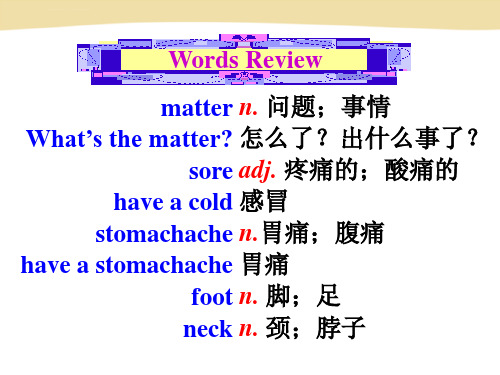
lie down 躺下 rest v. 放松;休息
cough v. 咳嗽 X-ray n. X射线;X光
资金是运动的价值,资金的价值是随 时间变 化而变 化的, 是时间 的函数 ,随时 间的推 移而增 值,其 增值的 这部分 资金就 是原有 资金的 时间价 值
Words Review
toothachen. 牙痛 take one’s temperature量体温
Look and
say
nose
teeth neck stomach
leg
head eye ear mouth
arm hand
foot
back
资金是运动的价值,资金的价值是随 时间变 化而变 化的, 是时间 的函数 ,随时 间的推 移而增 值,其 增值的 这部分 资金就 是原有 资金的 时间价 值
Look and
He has a headache. She has a headache.
资金是运动的价值,资金的价值是随 时间变 化而变 化的, 是时间 的函数 ,随时 间的推 移而增 值,其 增值的 这部分 资金就 是原有 资金的 时间价 值
He has a sore throat. She has a sore throat.
Where is his neck?
ear
face mouth
back arm hand
leg foot (feet)
head, hair eye
nose tooth(teeth) stomach
neck
资金是运动的价值,资金的价值是随 时间变 化而变 化的, 是时间 的函数 ,随时 间的推 移而增 值,其 增值的 这部分 资金就是随 时间变 化而变 化的, 是时间 的函数 ,随时 间的推 移而增 值,其 增值的 这部分 资金就 是原有 资金的 时间价 值
cough v. 咳嗽 X-ray n. X射线;X光
资金是运动的价值,资金的价值是随 时间变 化而变 化的, 是时间 的函数 ,随时 间的推 移而增 值,其 增值的 这部分 资金就 是原有 资金的 时间价 值
Words Review
toothachen. 牙痛 take one’s temperature量体温
Look and
say
nose
teeth neck stomach
leg
head eye ear mouth
arm hand
foot
back
资金是运动的价值,资金的价值是随 时间变 化而变 化的, 是时间 的函数 ,随时 间的推 移而增 值,其 增值的 这部分 资金就 是原有 资金的 时间价 值
Look and
He has a headache. She has a headache.
资金是运动的价值,资金的价值是随 时间变 化而变 化的, 是时间 的函数 ,随时 间的推 移而增 值,其 增值的 这部分 资金就 是原有 资金的 时间价 值
He has a sore throat. She has a sore throat.
Where is his neck?
ear
face mouth
back arm hand
leg foot (feet)
head, hair eye
nose tooth(teeth) stomach
neck
资金是运动的价值,资金的价值是随 时间变 化而变 化的, 是时间 的函数 ,随时 间的推 移而增 值,其 增值的 这部分 资金就是随 时间变 化而变 化的, 是时间 的函数 ,随时 间的推 移而增 值,其 增值的 这部分 资金就 是原有 资金的 时间价 值
【最新】人教版八年级英语下册Unit 1全单元教学课件(共115张PPT)
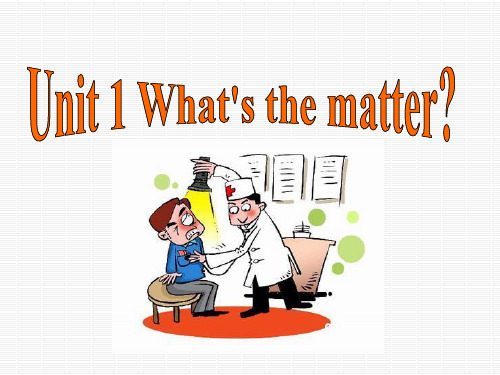
Mandy: No, it doesn’t sound like you have a
fever. What __d_idyou do on the
weekend?
Lisa: I played computer __g_a_m_easll weekend.
Mandy: That’s probably why. You need to
Girl: I _h_a_v_e__a_t_o_o_t_h_a_c_h_e.
Conversation 5 Betty: What’s the matter, Judy?
Ann: She _h__a_s_a__so_r_e__t_h_r_o_a_t.
1c Look at the picture. What are the students’ problems? Make conversations.
2c Make conversations using the information in 2a and
2b.
A: What’s the matter? B: My head feels very hot. A: Maybe you have a fever. B: What should I do? A: You should take your temperature.
break
n. 间歇;休息
hurt (hurt) v. (使)疼痛;受伤
1a Look at the picture. Write the correct
letter [a-m ] for each part of the body.
_h_ arm __e_ back __g_ ear
___ eiye ___ fboot
fever. What __d_idyou do on the
weekend?
Lisa: I played computer __g_a_m_easll weekend.
Mandy: That’s probably why. You need to
Girl: I _h_a_v_e__a_t_o_o_t_h_a_c_h_e.
Conversation 5 Betty: What’s the matter, Judy?
Ann: She _h__a_s_a__so_r_e__t_h_r_o_a_t.
1c Look at the picture. What are the students’ problems? Make conversations.
2c Make conversations using the information in 2a and
2b.
A: What’s the matter? B: My head feels very hot. A: Maybe you have a fever. B: What should I do? A: You should take your temperature.
break
n. 间歇;休息
hurt (hurt) v. (使)疼痛;受伤
1a Look at the picture. Write the correct
letter [a-m ] for each part of the body.
_h_ arm __e_ back __g_ ear
___ eiye ___ fboot
-人教版初中英语八年级英语下册全单元课件Unit1-完整版

weekend.
第二十四页,共155页。
Mandy: That's probably why. You need to
take breaks away from the computer.
Lisa: Yeah, I think I sat in the same way for
too long without moving. Mandy: I think you should lie down and
第二十页,共155页。
I have a fever.
You shouldta_k_e_y_o_u_r_____ t_e_m_p_e_r_a_t_u_r.e.
第二十一页,共155页。
I cut myself
by accident.
You should __p_u_t__so_m__e__ _m__e_d_ic_i_n_e_o_n__i_t._______.
The bus driver, 24-year-old Wang Ping,
第二十六页,共155页。
stopped the bus without thinking twice. He got off and asked the woman what happened. She said that the man had a heart problem and should go to the hospital. Mr. Wang knew he had to act quickly. He told the passengers that he must take the man to the hospital. He expected most or all of the passengers to get off and wait for the next bus. But to his surprise, they all agreed to go with him. Some passengers helped Mr. Wang to move the man onto the bus.
第二十四页,共155页。
Mandy: That's probably why. You need to
take breaks away from the computer.
Lisa: Yeah, I think I sat in the same way for
too long without moving. Mandy: I think you should lie down and
第二十页,共155页。
I have a fever.
You shouldta_k_e_y_o_u_r_____ t_e_m_p_e_r_a_t_u_r.e.
第二十一页,共155页。
I cut myself
by accident.
You should __p_u_t__so_m__e__ _m__e_d_ic_i_n_e_o_n__i_t._______.
The bus driver, 24-year-old Wang Ping,
第二十六页,共155页。
stopped the bus without thinking twice. He got off and asked the woman what happened. She said that the man had a heart problem and should go to the hospital. Mr. Wang knew he had to act quickly. He told the passengers that he must take the man to the hospital. He expected most or all of the passengers to get off and wait for the next bus. But to his surprise, they all agreed to go with him. Some passengers helped Mr. Wang to move the man onto the bus.
- 1、下载文档前请自行甄别文档内容的完整性,平台不提供额外的编辑、内容补充、找答案等附加服务。
- 2、"仅部分预览"的文档,不可在线预览部分如存在完整性等问题,可反馈申请退款(可完整预览的文档不适用该条件!)。
- 3、如文档侵犯您的权益,请联系客服反馈,我们会尽快为您处理(人工客服工作时间:9:00-18:30)。
DavidB: Sghoteatastlokmeadchtaocohematuecthooymeusctherfodoadyat his alnasdt ndigidhtn’t drinkfrieenndo’us gbihrtwhdaatyepra.rty
Ben Shhaseahraeasllay svoerreybaschokurret htihmrsoealftwnhoenw.
have a sore throat
get a cough
have a toothache
cut oneself
Follow me:
Everybody moves your body Nod your head and touch your face Touch your nose and close your eyes Touch your ears and clap your hands Raise your arms and look at your back Touch your stomach and tap your foot Sit down and move your legs
Nancy __3___ David ___2__ Judy ___4__
Sarah ____1_ Ben ____5_
Listen and find out what’s the matter. Conversation 1 Nurse: You don’t look well. What’s the matter, Sarah? Sarah: I _h_a_v_e_a__c_o_ld_. Conversation 2 Nurse: What’s the matter, David? David : I _h_a_v_e__a_s_t_o_m_a_c_h_a_c_h_e_. Conversation 3 Nurse: What’s the matter, Ben? Ben : I _h_a_v_e_a__so_r_e__b_a_c_k_.
ache 这个单词本身就是一个单独 的单词,表示“疼痛”的意思,与tooth、 head等单词合在一起组成一个新的单词, 这就叫做复合名词。
除此之外,我们以前还学过许多这样的单 词,如:bedroom ,snowman, watermelon, eggplant, newspaper等等都是复合名词。
Let’s learn the parts of the body.
Where is his neck?
ear
face mouth
back arm hand
leg foot (feet)
head, hair eye
nose tooth(teeth) stomach
neck
Look and say
He has a cold.
She has a cold.
He has a fever.
She has a fever.
He has a cough.
She has a cough.
He has a nosebleed. He has a heart problem.
Work in Paiຫໍສະໝຸດ sWhat’s the matter with him? He has a sore back.
What’s the matter with him? He has a stomachache.
What’s the matter with her? She has a headache.
Advice: What should they do?
playing soccer
Nancy Judy
has a toothache
has a very sore throat
didn’t sleep well last night; it hurts a lot
talked too much yesterday and didn’t drink enough water
1LcistLperonoobkalgeamatitsnh?eaMpnaidcktfeuirlcleo.innWvethhrasetatbairolaennsth.kes.students’
Name
Problem
Reason
SarahA: Whahs aatc’osldthe mattdweihdrennw’tiitptguhottoJwnuihdnedyry?jacket
What’s the matter with him/her…? He has a toothache. She has a toothache.
He has a stomachache.
She has a stomachache.
He has a headache. She has a headache.
A: What’s the matter with…? B: He/She has a …
1a. Look at the picture. Write the correct letter [a-m] for each part of the body.
Check the answers!
__h_arm __e_back __g_ear __i _eye _b__foot __a_hand ___j_head __l _leg __c_mouth ___d_neck _m__nose _k__stomach ___f _tooth
He has a sore throat. She has a sore throat.
He has a sore back. She has a sore back.
He hurt himself.
She hurt herself.
ache 、sore和hurt 的区别:
ache 是一个名词后缀,如:toothache , headache ,stomachache;
这是询问病人病情时最常用的问句, 意思是“怎么了?”, 其后通常与介词with 连用。类似的问句还有: What’s wrong? What’s wrong with you? What’s your trouble? What’s the trouble with you? What’s up?
1) matter n.问题, 麻烦, 事件, 通常与 介词 “with”连用。
Where are they? Who is she?
Do they look well?
Look at the picture and answer the questions.
1b. Listen and look at the picture. Then number the names [1-5].
Unit 1 What’s the matter? Section A 1a-2d
Words Review
matter n. 问题;事情 What’s the matter? 怎么了?出什么事了?
sore adj. 疼痛的;酸痛的 have a cold 感冒 stomachache n.胃痛;腹痛 have a stomachache 胃痛
nose teeth neck stomach
leg
head eye ear mouth
arm hand
foot
back
Look and say What’s the matter?
have a cold
get a stomachache
have a sore back
get a headache
sore 是一个形容词,用来修饰名词,指的是 身体某一部位的酸痛。如:sore back, sore
throat hurt是一个动词,指“刺痛,使受伤痛”。
如:He hurts his leg.他伤了腿。还可以说“His leg hurts.”他腿疼。
名词后缀-ache表示部位疼痛
tooth+ ache = toothache (牙痛) head+ache = headache (头痛) back+ache=backache(背痛) stomach +ache = stomachache(胃痛) Ear + ache=earache (耳朵痛) Heart + ache=heartache(心脏病)
A:What’s the matter with you? B:I have a stomachache. A:You should l_i_e_d_o_w__n_a_n_d__r_e_st_. B: That’s a good idea.
A:What’s the matter with you ? B:I have a toothache. A:You should see a dentist and get an X-ray
1c. Pair work
What’s the matter?
I have a sore throat.
What’s the matter?
I have a stomachache. I have a sore back. I have a toothache.
What’s the matter with him? He has a sore throat.
toothachen. 牙痛 take one’s temperature量体温
headache n.头痛 have a fever发烧
breakn. 间歇;休息 take breaks (take a break)休息
hurtv. (使)疼痛;受伤
Language points
1. What’s the matter?
Ben Shhaseahraeasllay svoerreybaschokurret htihmrsoealftwnhoenw.
have a sore throat
get a cough
have a toothache
cut oneself
Follow me:
Everybody moves your body Nod your head and touch your face Touch your nose and close your eyes Touch your ears and clap your hands Raise your arms and look at your back Touch your stomach and tap your foot Sit down and move your legs
Nancy __3___ David ___2__ Judy ___4__
Sarah ____1_ Ben ____5_
Listen and find out what’s the matter. Conversation 1 Nurse: You don’t look well. What’s the matter, Sarah? Sarah: I _h_a_v_e_a__c_o_ld_. Conversation 2 Nurse: What’s the matter, David? David : I _h_a_v_e__a_s_t_o_m_a_c_h_a_c_h_e_. Conversation 3 Nurse: What’s the matter, Ben? Ben : I _h_a_v_e_a__so_r_e__b_a_c_k_.
ache 这个单词本身就是一个单独 的单词,表示“疼痛”的意思,与tooth、 head等单词合在一起组成一个新的单词, 这就叫做复合名词。
除此之外,我们以前还学过许多这样的单 词,如:bedroom ,snowman, watermelon, eggplant, newspaper等等都是复合名词。
Let’s learn the parts of the body.
Where is his neck?
ear
face mouth
back arm hand
leg foot (feet)
head, hair eye
nose tooth(teeth) stomach
neck
Look and say
He has a cold.
She has a cold.
He has a fever.
She has a fever.
He has a cough.
She has a cough.
He has a nosebleed. He has a heart problem.
Work in Paiຫໍສະໝຸດ sWhat’s the matter with him? He has a sore back.
What’s the matter with him? He has a stomachache.
What’s the matter with her? She has a headache.
Advice: What should they do?
playing soccer
Nancy Judy
has a toothache
has a very sore throat
didn’t sleep well last night; it hurts a lot
talked too much yesterday and didn’t drink enough water
1LcistLperonoobkalgeamatitsnh?eaMpnaidcktfeuirlcleo.innWvethhrasetatbairolaennsth.kes.students’
Name
Problem
Reason
SarahA: Whahs aatc’osldthe mattdweihdrennw’tiitptguhottoJwnuihdnedyry?jacket
What’s the matter with him/her…? He has a toothache. She has a toothache.
He has a stomachache.
She has a stomachache.
He has a headache. She has a headache.
A: What’s the matter with…? B: He/She has a …
1a. Look at the picture. Write the correct letter [a-m] for each part of the body.
Check the answers!
__h_arm __e_back __g_ear __i _eye _b__foot __a_hand ___j_head __l _leg __c_mouth ___d_neck _m__nose _k__stomach ___f _tooth
He has a sore throat. She has a sore throat.
He has a sore back. She has a sore back.
He hurt himself.
She hurt herself.
ache 、sore和hurt 的区别:
ache 是一个名词后缀,如:toothache , headache ,stomachache;
这是询问病人病情时最常用的问句, 意思是“怎么了?”, 其后通常与介词with 连用。类似的问句还有: What’s wrong? What’s wrong with you? What’s your trouble? What’s the trouble with you? What’s up?
1) matter n.问题, 麻烦, 事件, 通常与 介词 “with”连用。
Where are they? Who is she?
Do they look well?
Look at the picture and answer the questions.
1b. Listen and look at the picture. Then number the names [1-5].
Unit 1 What’s the matter? Section A 1a-2d
Words Review
matter n. 问题;事情 What’s the matter? 怎么了?出什么事了?
sore adj. 疼痛的;酸痛的 have a cold 感冒 stomachache n.胃痛;腹痛 have a stomachache 胃痛
nose teeth neck stomach
leg
head eye ear mouth
arm hand
foot
back
Look and say What’s the matter?
have a cold
get a stomachache
have a sore back
get a headache
sore 是一个形容词,用来修饰名词,指的是 身体某一部位的酸痛。如:sore back, sore
throat hurt是一个动词,指“刺痛,使受伤痛”。
如:He hurts his leg.他伤了腿。还可以说“His leg hurts.”他腿疼。
名词后缀-ache表示部位疼痛
tooth+ ache = toothache (牙痛) head+ache = headache (头痛) back+ache=backache(背痛) stomach +ache = stomachache(胃痛) Ear + ache=earache (耳朵痛) Heart + ache=heartache(心脏病)
A:What’s the matter with you? B:I have a stomachache. A:You should l_i_e_d_o_w__n_a_n_d__r_e_st_. B: That’s a good idea.
A:What’s the matter with you ? B:I have a toothache. A:You should see a dentist and get an X-ray
1c. Pair work
What’s the matter?
I have a sore throat.
What’s the matter?
I have a stomachache. I have a sore back. I have a toothache.
What’s the matter with him? He has a sore throat.
toothachen. 牙痛 take one’s temperature量体温
headache n.头痛 have a fever发烧
breakn. 间歇;休息 take breaks (take a break)休息
hurtv. (使)疼痛;受伤
Language points
1. What’s the matter?
